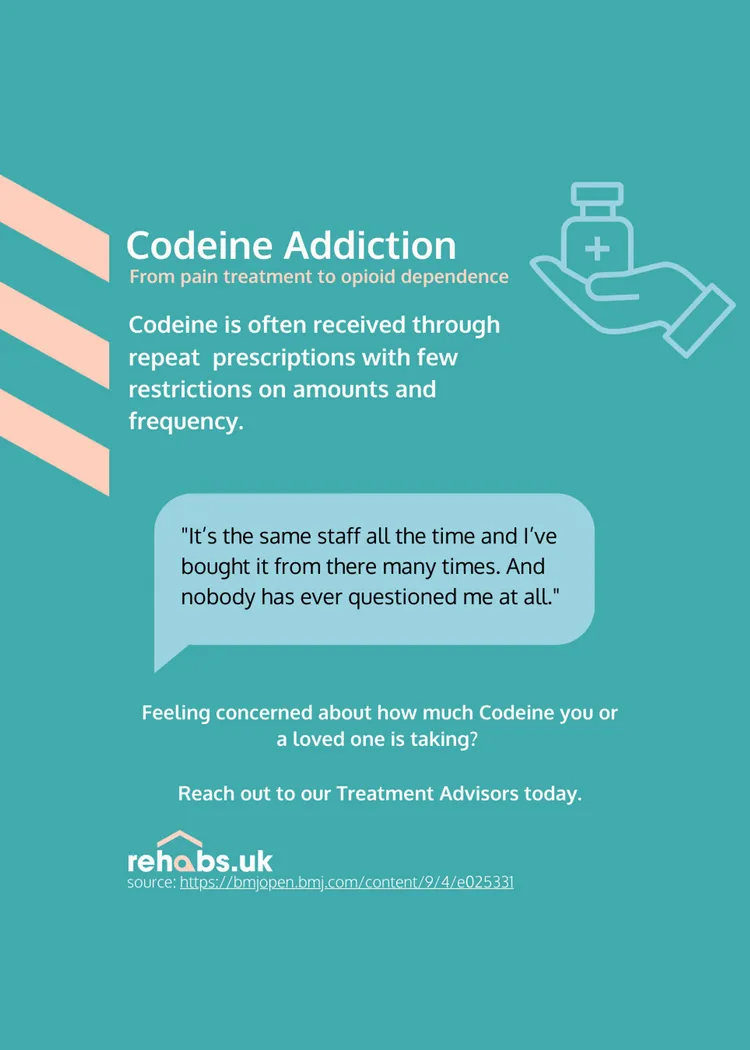Codeine is a painkiller derived from Morphine. It is used to treat mild to moderate degrees of pain. It is also used as a cough medicine and to treat diarrhoea however due to its addictive properties it can lead to dependence.
It comes in three forms:
- Tablets (15mg, 30mg or 60mg).
- A liquid that is swallowed (containing 25mg of codeine in each 5ml dose or, as in cough syrup, 15mg per 5ml dose).
- An injection, which is usually only given in hospital.
Codeine is available on prescription. Lower doses can be bought in pharmacies, usually mixed with another painkiller such as paracetamol (co-codamol), ibuprofen or aspirin. Codeine is an opiate, derived from morphine, and like all opioids it can be addictive and that's why it can lead to prescription drug dependence. Due to its addictive properties it can also make it very difficult to detox from Codeine at home, therefore residential rehabilitation is often recommended due to the level of support required.
Why is Codeine Addictive?
Codeine works by binding to opioid receptors in the brain and spinal cord. These receptors are part of the body's natural pain-relief system, but when activated by opioids like codeine, they also produce feelings of euphoria and relaxation. Due to this a drug called "Lean" also known as purple drank has become popular in recreational drug taking where the user mixes prescription-strength cough syrup (containing codeine and promethazine) with fizzy drinks. Those consuming it may come to rely on codeine to cope with stress, anxiety, or emotional pain, developing a strong psychological need for the drug even if they are not physically dependent.
"We have seen increasing evidence of problematic use and harms with over-the-counter codeine. This includes increasing non-medical use, dependence, illness and accidental fatal overdose.”
“Most people who develop dependence on codeine do not have a history of using other illicit substances.” said Dr Nielsen.
“Many are not familiar with where to access treatment for drug dependence and due to stigma around substance use access to treatment is often delayed.”
If you are worried about you or a loved one becoming addicted to prescription medication and want to explore what treatments are available contact our Treatment Advisors for a free assessment.


Codeine is one of the mostly commonly prescribed painkillers and as such access to it is readily available.
Addiction is a disorder of the brain’s reward system where the user is compelled to engage in rewarding behaviours – in this case, taking codeine – despite an awareness of the negative consequences. Over time, repeated exposure to addictive substances changes the levels of certain chemicals in the brain. Higher levels of chemicals such as dopamine drives the affected person to continually recreate the positive feelings that result from higher levels of these chemicals, deepening the addiction in order to prevent a drop in dopamine and negative feelings.
Codeine is addictive as it can produce a feeling of pleasure and a relaxing ‘high’, a rewarding stimulus which addicted individuals are compelled to replicate. Codeine is also physically addictive – long-term users often feel the need to take codeine to avoid withdrawal symptoms.
There are no definite ‘rules’ when it comes to causes of codeine addiction. Users of codeine may have initially been prescribed it by a doctor to manage pain, but over time, they may develop a tolerance to the drug. As their tolerance increases, they may find that the prescribed dose is no longer effective, leading them to abuse their prescription medication. This escalation can result in the misuse of their medication and potentially lead to codeine addiction.
Despite being in similar circumstances, one person may develop an addiction when another person does not. However, a number of factors that may cause codeine addiction have been identified, such as environment, psychology, genetics and brain chemistry. There has also been great debate about whether trauma triggers addiction. An article titled 'CODEINE ADDICTION WITH DEATH POSSIBLY DUE TO ABRUPT WITHDRAWAL' identified that by looking at all the literature Codeine is a very addictive drug.
It can be difficult to spot a codeine addiction as those affected often go to great lengths to hide their condition due to the stigma associated with drug abuse and addiction.
However, there are a number of physical and behavioural symptoms that may suggest a codeine addiction.
These include:
- Nausea and vomiting
- Constipation
- A blue tinge to lips and fingernails
- Muscle twitches or spasms
- Dizziness and fainting
- A dry mouth
- Itching and rashes
- Difficulty urinating
- Low blood pressure
- Seizures
- Slower breathing
- Clammy hands and feet
- Stomach pain
- Changes in vision

Codeine abuse – and indeed drug abuse of any kind – is different to codeine addiction. Addiction means the user has a strong urge to take codeine, regardless of the consequences. However, drug abuse is often the first step on the road to addiction.
Codeine abuse can make it difficult for people to handle their usual responsibilities at work and at home. It may also lead people to behave in a way they wouldn’t usually and develop physical side effects.
Codeine addiction develops once someone becomes more tolerant of the drug, needing to take more to achieve the same results and/or suffering from withdrawal symptoms without codeine. Addiction also means that, despite understanding that codeine has harmful effects, the person continues to take it.
Dr Alison Cave, MHRA Chief Safety Officer, said:
Codeine addiction can be a gradual process. If you have been taking it for a long time and want to stop, you can talk to your healthcare provider and reduce the amount you take slowly.









